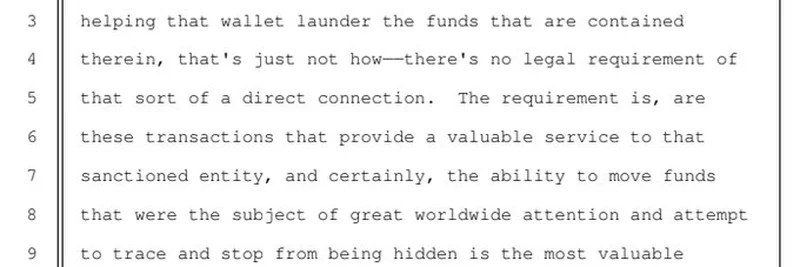Hey there, crypto enthusiasts and blockchain buffs! If you’ve been keeping an eye on the wild world of decentralized finance (DeFi), you’ve probably heard about the ongoing legal saga involving Roman Storm, a developer tied to Tornado Cash. On July 26, 2025, Amanda Tuminelli, a key figure at fund_defi, dropped a bombshell on X that’s got everyone talking. Let’s break it down and see what this means for the future of blockchain innovation.
What’s the Case All About?
For those new to the story, Roman Storm is facing serious charges from the U.S. Department of Justice (DOJ). They allege that his work on Tornado Cash—a privacy-focused tool on the Ethereum blockchain—helped sanctioned entities, like North Korea (DPRK), launder money. The DOJ claims this makes Storm liable under the International Emergency Economic Powers Act (IEEPA) and money laundering laws. Storm, however, says he just built an open-source tool for anyone to use, with no direct intent to aid bad actors.
In her latest X post (link to the tweet), Tuminelli calls out the DOJ’s shaky logic. She points out that the government’s argument hinges on Storm “providing a valuable service” simply because DPRK used his software. To illustrate how absurd this is, she compares it to a hammer maker being blamed if DPRK uses their tool. Imagine holding Apple or Google accountable for iPhones or tech suites used by sanctioned entities—sounds ridiculous, right? Yet, that’s the precedent the DOJ is pushing here.
The Legal Twist: No Direct Connection?
Tuminelli’s post dives into a critical detail: past sanctions cases always involved a clear link between the defendant and a sanctioned entity. Her team at fund_defi, alongside co-author jchervinsky, reviewed over 100 cases and found zero instances where someone was convicted for creating a general-use tool later picked up by a bad actor. This lack of “direct connection” is a big deal. The image attached to her tweet lays it out plainly: just because an intermediary wallet helps launder funds doesn’t mean it’s a sanctions violation without proof of intent or control.
This argument echoes the amicus brief they filed earlier (referenced in her post), which you can dig into for more details. The brief argues that holding developers liable for third-party misuse stretches the law way too far, especially for immutable smart contracts where developers have no ongoing control.
Why This Matters to Blockchain Devs
This case isn’t just about Storm—it’s a wake-up call for every blockchain developer out there. Open-source projects like Tornado Cash are built to be decentralized and accessible, but this legal battle could set a dangerous precedent. If developers can be prosecuted for how others use their code, it might stifle innovation in DeFi and beyond. Tuminelli’s analogy to everyday tools like hammers or iPhones highlights the absurdity: should a car manufacturer be jailed if a criminal uses their vehicle for a heist?
The X community is buzzing with reactions. Some, like CB eth/acc, are shocked the case has gone this far, hinting at either ignorance or a power grab by law enforcement. Others, like Chris Grieco, suggest a scorched-earth response if Storm is convicted, targeting banking CEOs too. It’s clear this debate is heating up!
What’s Next?
As of now, the DOJ is doubling down in their Rule 29 response, but the outcome remains uncertain. The court’s decision could redefine how liability works in the crypto space. For meme token creators and DeFi practitioners following meme-insider.com, this is a chance to learn about the intersection of law and tech. Stay tuned as we cover more updates—knowledge is power in this evolving landscape!
Got questions or thoughts? Drop them in the comments below or join the conversation on X. Let’s keep exploring the wild world of blockchain together!


